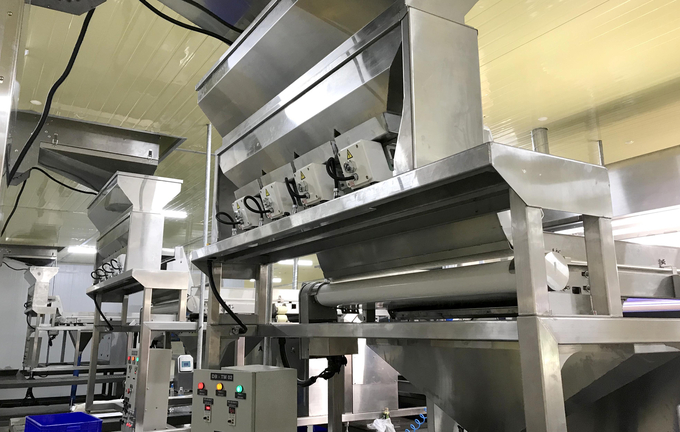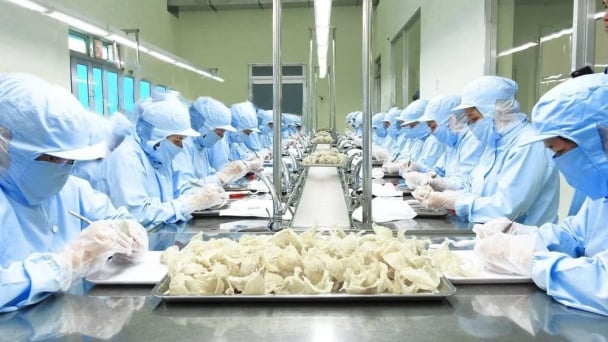May 15, 2025 | 13:52 GMT +7
May 15, 2025 | 13:52 GMT +7
Hotline: 0913.378.918
May 15, 2025 | 13:52 GMT +7
Hotline: 0913.378.918

A cashew processing line in a factory of Tan Long Group. Photo: Thanh Son.
According to the Vietnam Cashew Association (Vinacas), currently, Vietnam accounts for nearly 80% of the world's cashew kernel exports.
The main reason that Vietnam's cashew industry leads the world in processing and exporting cashew kernels is its complete mastery of cashew processing technology. Mr. Pham Van Cong, Chairman of Vinacas, affirmed that the most significant advantage of Vietnam's cashew industry is the world's most advanced cashew processing technology produced by Vietnamese people.
From 2008 - 2010, Vinacas proposed and was assigned to implement the state-level science and technology program "Completing technology, design, and manufacturing of automatic cashew shelling machines and cashew kernel peeling machines in cashew processing line for export." In 2011, this program was rated excellent by the State Science Council, opening a period of brilliant development for the cashew processing industry.
Over the past 10 years, thanks to promoting the application of science and technology, mechanization and automation, Vietnam's cashew industry has solved a series of difficult problems. The birth of machines and equipment such as cashew shelling machines, silk peeling machines, color sorting machines, and size sorting machines has helped the cashew industry reduce labor by 70 - 80%, overcoming the labor shortage situation.

Mastering technology has helped Vietnam's cashew industry maintain its leading export position for many years. Photo: TS.
Machines and equipment have helped factories improve processing productivity, reduce processing time, and help the cashew kernel production process from raw material warehousing to finished product packaging in 13 - 14 days reduced to 7 days. In particular, Vietnamese-made machinery and equipment have helped factories significantly reduce the breakage rate compared to manual production, with a much higher reduction than the same machinery and equipment of foreign countries. That's why some companies from Italy, India, Brazil... had to buy machinery and cashew processing equipment from Vietnam to supplement the shortcomings in their technology.
Our country's cashew processing technology has attracted the attention of many countries for a long time. When focusing on developing domestic cashew processing to create jobs and add value to native cashew nuts, African countries have come to Vietnam to buy cashew processing equipment and technology.

Many countries highly appreciate Vietnam's cashew processing machinery and equipment. Photo: Thanh Son.
The amount of cashew kernels the EU imports from some African countries is increasing rapidly. Specifically, in the first 11 months of 2023, Ivory Coast cashew kernels imported into the EU reached 16.6 thousand tons, worth USD 98 million, an increase of 41% in volume and 25% in turnover compared to the same period in 2022. Also in the same period. This time, the number of cashew nuts imported into the EU from another African country, Burkina Faso, reached 2,765 tons, worth USD 18.5 million, an increase of 16% in volume and 13% in turnover.
In the EU market, African cashew kernels have an advantage over Vietnamese cashew kernels thanks to more competitive prices due to support from the government in encouraging the development of the processing industry, and available raw cashew materials on-site and shipping costs are much lower. On the other hand, African cashew kernels imported into the EU are also supported by policies of European countries to encourage the cashew processing industry to develop in Africa to create jobs and reduce hunger and poverty, thereby reducing the flow of illegal migrants into Europe.

Vietnam's cashew industry faces fierce competition with African countries in the international market. Photo: TS.
African countries' purchase of Vietnamese cashew processing technology to develop domestic cashew processing adversely impacts Vietnam's cashew industry. First, many African countries have issued floor prices for raw cashew exports to limit the export of raw cashew nuts and encourage cashew kernel processing. Even though global raw cashew output is abundant, the price of raw cashew nuts is often unreasonable compared to the cost of cashew kernels. Therefore, although export volume increased in 2023, most Vietnamese cashew factories were unprofitable, even at a loss, and at risk of mass closure.
Facing the development of the African cashew processing industry, with technology mainly coming from Vietnam, in recent years, the cashew industry has had quite fierce debates surrounding whether to request the state to ban exports. Whether or not to export technology, machinery, and cashew processing equipment to Africa.
To date, this debate has subsided because cashew processing technology is not on the list of goods banned from export. Companies specializing in producing and supplying cashew processing machinery and equipment must also diversify markets and customers to expand scale and increase profits, especially when the cashew processing industry is developing in Africa - the world's giant raw cashew-producing region. Exporting cashew processing machinery and equipment also brings more foreign currency to the country and contributes to overall export growth. There are even companies whose primary market is Africa, not Vietnam.
Translated by Tuan Huy

(VAN) Japan's efforts to lower the price of rice through the release of its stockpile may finally be making some progress, albeit at a snail's pace.

(VAN) U.S. tariffs are not only a 'shock', but also an opportunity for Vietnamese businesses to renew their mindset toward comprehensive development.

(VAN) As Bac Giang lychee enters the harvest season, Minister Do Duc Duy expects that the fruit will contribute greatly to agricultural exports due to standardized production and deep processing.

(VAN) Consumers have shown a preference for free-range eggs, but those farming systems are more vulnerable to biosecurity risks like bird flu.
/2025/05/09/5701-1-184335_301.jpg)
(VAN) Vietnam’s eel exports nearly doubled thanks to a mud-free farming model, opening up new prospects while still facing numerous barriers related to international standards.

(VAN) Minister Do Duc Duy warned that if production is not professionalized and supply chains are not transparent, the U.S. market could become a growth bottleneck.

(VAN) Delegating surveillance responsibilities to local authorities is a cost-saving and efficiency-boosting measure that removes a key bottleneck for enterprises, according to Director General Duong Tat Thang.